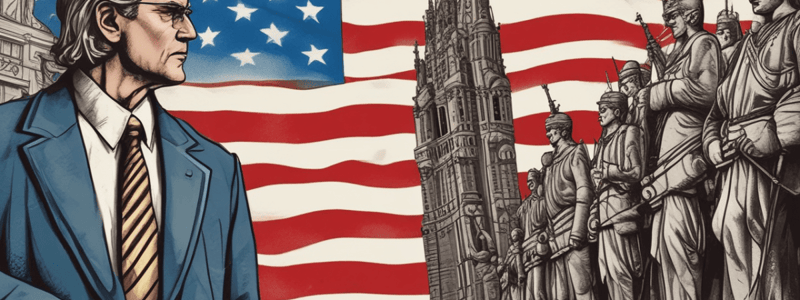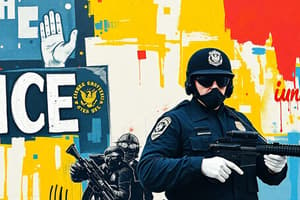Podcast
Questions and Answers
What was the basis of the appellate court's decision to find probable cause for the mother's arrest?
What was the basis of the appellate court's decision to find probable cause for the mother's arrest?
- Obstruction charges (correct)
- Failure to comply with designated recording areas
- Recording law enforcement officers in public
- Disobeying verbal warnings
What is the primary concern when considering an arrest for recording law enforcement officers in public?
What is the primary concern when considering an arrest for recording law enforcement officers in public?
- The individual's right to free speech
- The officer's privacy
- Obstruction of official duties (correct)
- The individual's right to bear arms
What is the recommended approach when an individual is recording law enforcement officers in public and obstructing their duties?
What is the recommended approach when an individual is recording law enforcement officers in public and obstructing their duties?
- Issue a verbal warning and designate a recording area (correct)
- Request backup to surround the individual
- Confiscate the recording device
- Immediately arrest the individual
What is the significance of the Glik v. Cunniffe case in relation to recording law enforcement officers?
What is the significance of the Glik v. Cunniffe case in relation to recording law enforcement officers?
What is the purpose of the OGC publication discussed in the content?
What is the purpose of the OGC publication discussed in the content?
What is the consequence of continuing to obstruct law enforcement duties after being warned?
What is the consequence of continuing to obstruct law enforcement duties after being warned?
What is the primary consideration when determining whether to arrest an individual for recording law enforcement officers in public?
What is the primary consideration when determining whether to arrest an individual for recording law enforcement officers in public?
What was Simon Glik doing when he was arrested?
What was Simon Glik doing when he was arrested?
What is the role of the appellate court in the case discussed in the content?
What is the role of the appellate court in the case discussed in the content?
What was Simon Glik charged with?
What was Simon Glik charged with?
What was the main issue in Simon Glik's lawsuit?
What was the main issue in Simon Glik's lawsuit?
Why did the court find no probable cause supporting the wiretap charge?
Why did the court find no probable cause supporting the wiretap charge?
What happened to the charges against Simon Glik?
What happened to the charges against Simon Glik?
What was Simon Glik doing on the evening of October 1, 2007?
What was Simon Glik doing on the evening of October 1, 2007?
Why did the court find that the officers' unhappiness about being recorded did not make a lawful exercise of a First Amendment right a crime?
Why did the court find that the officers' unhappiness about being recorded did not make a lawful exercise of a First Amendment right a crime?
What was Simon Glik's lawsuit under?
What was Simon Glik's lawsuit under?
According to the 2013 legal bulletin, what should deputies do when a member of the public films them in public?
According to the 2013 legal bulletin, what should deputies do when a member of the public films them in public?
What was the mother's son detained for in the Ford case?
What was the mother's son detained for in the Ford case?
What did the mother in the Ford case do immediately after arriving at the movie theater?
What did the mother in the Ford case do immediately after arriving at the movie theater?
What charges was the mother booked for in the Ford case?
What charges was the mother booked for in the Ford case?
Why did the State decline to file charges against the mother in the Ford case?
Why did the State decline to file charges against the mother in the Ford case?
What did the mother in the Ford case allege in her lawsuit against the municipality?
What did the mother in the Ford case allege in her lawsuit against the municipality?
What is a necessary condition for the mother to establish a civil rights violation in her lawsuit?
What is a necessary condition for the mother to establish a civil rights violation in her lawsuit?
What is an inaccurate reading of the 4th District Court of Appeal's ruling in the Ford case?
What is an inaccurate reading of the 4th District Court of Appeal's ruling in the Ford case?
Why did Glik stop recording video footage of the arrest?
Why did Glik stop recording video footage of the arrest?
What is the fundamental principle that supports the right to record police officers in public?
What is the fundamental principle that supports the right to record police officers in public?
What is the significance of the First Amendment in the context of Glik's case?
What is the significance of the First Amendment in the context of Glik's case?
What is the implication of the court's decision in Glik's case?
What is the implication of the court's decision in Glik's case?
What is the significance of the case Smith v. City of Cumming?
What is the significance of the case Smith v. City of Cumming?
What is the common theme among the federal circuit courts' rulings?
What is the common theme among the federal circuit courts' rulings?
What is the significance of the case Fordyce v. City of Seattle?
What is the significance of the case Fordyce v. City of Seattle?
What is the importance of the right to record police officers in public?
What is the importance of the right to record police officers in public?
In the case of Television, Inc., what was the court's finding regarding the filming of a public official?
In the case of Television, Inc., what was the court's finding regarding the filming of a public official?
What was the issue in the Channel 10, Inc. v. Gunnarson case?
What was the issue in the Channel 10, Inc. v. Gunnarson case?
What was the outcome of the Schnell v. City of Chicago case?
What was the outcome of the Schnell v. City of Chicago case?
In Connell v. Town of Hudson, what was the outcome of the case?
In Connell v. Town of Hudson, what was the outcome of the case?
What was the issue in the Pomykacz v. Borough of West Wildwood case?
What was the issue in the Pomykacz v. Borough of West Wildwood case?
What was the issue in the Robinson v. Fetterman case?
What was the issue in the Robinson v. Fetterman case?
What is the common thread among the cases mentioned?
What is the common thread among the cases mentioned?
What is the significance of the Kelly v. case mentioned in the context?
What is the significance of the Kelly v. case mentioned in the context?
Flashcards are hidden until you start studying
Study Notes
Video/Audio Recording of Law Enforcement in Public
- In July 2013, the Office of the General Counsel issued a legal bulletin stating that filming of law enforcement officers in public is protected by the First Amendment.
- Deputies should show great tolerance when this occurs and not base an arrest merely on the fact that a member of the public is filming their conduct.
Recent Decision by the 4th District Court of Appeal (Ford v City of Boynton Beach)
- A mother was arrested for recording law enforcement officers in a public place, but the court ruled that probable cause for her arrest existed solely for obstruction charges.
- The court did not address the issue of whether there was probable cause to arrest the mother for recording law enforcement officers in public.
Key Facts
- An arrest should not be made merely because members of the public are recording law enforcement while performing their duties in a public setting.
- However, if such recording obstructs the performance of law enforcement in their official duties, then appropriate steps may be taken to address the obstruction.
- This may include verbal warnings, designating a place where individuals can stand and record, and advising them that they will be arrested if they continue to obstruct.
First Amendment Principles
- The First Amendment protects the right to videotape police carrying out their duties in public.
- Gathering information about government officials in a form that can readily be disseminated to others serves a cardinal First Amendment interest in protecting and promoting the free discussion of governmental affairs.
Case Law
- Glik v. Cunniffe (2011): The First Circuit Court ruled that the First Amendment protects the right to record police officers performing their duties in public.
- Other federal circuit courts have also recognized a First Amendment right to film or record law enforcement officers in public, including the 9th, 11th, and District Courts.
Studying That Suits You
Use AI to generate personalized quizzes and flashcards to suit your learning preferences.




